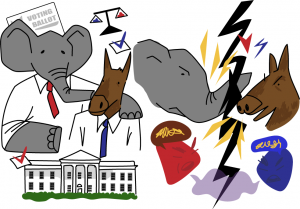Political Parties Are Destroying and Dividing Our Democracy
November 24, 2020
“There is nothing I dread So much, as a division of the Republic into two great Parties, each arranged under its Leader, and converting Measures in opposition to each other,” founding father and second U.S. president John Adams warned in a letter from 1780. “This… is to be dreaded as the greatest political Evil, under our Constitution.”
Over two centuries later, Adams’ fear about political parties battling against each other has been proven to be a reality. A country originally birthed upon the value of unity, we now see ourselves living in a nation defined by partisanship and political division. To combat the “us” vs “them” mentality between parties, we need to stop fixating on spewing hatred and finding every fault with the opposing party, but rather, spread empathy by being more open-minded to other political sentiments.
In a September 2019 survey, 64% and 55% of Republicans and 75% and 47% of Democrats called members of the opposing party “closed-minded” and “immoral,” respectively. This was an increase in both parties equating each other with negative traits since spring of 2016, according to the Pew Research Center.
“We have created a political system that rewards people with reelection by being intransigent [and] unwilling to compromise because if you compromise and you talk to people on the other side and you work with them, you’re going to get attacked by your own party in a primary,” former congressman Mickey Edwards said in an interview with The Atlantic.
Democrats and Republicans are increasingly segregating into rival teams who are constantly chastising each other, rather than striving to find a consensus. Thorough evaluation of policies, facts and personal values are often disregarded as people rely on party affiliations and political labels to vote.
Moreover, due to having only two major political parties, Americans are forced to fit themselves into the little red or blue box, because otherwise, their voices won’t be heard through the smaller Independent, Libertarian or Green parties.
“Oftentimes because we only have two major political parties, we don’t hear everyone’s voice,” passion civics teacher Kathryn Beechinor said. “Not everyone’s voice is being heard through the Republican party or the Democratic party because they don’t represent everyone in the two platforms that they run.”
The ever-increasing partisanship in the United States is becoming even more exhausting to mitigate with the rise of Generation Z’s toxic “cancel culture.” To “cancel” someone initially meant to publicly criticize and shame those who say or do offensive things, particularly through social media platforms. However, the ideology has recently evolved into aggressively “cancelling” those who may express opposing views to political mainstream opinions.
“When someone brings up a perspective where they say that…they support the Republican party or that, let’s say they’re pro life or they’re anti gun control, something like that…they’ll get immediately attacked by every other student at the school [who] doesn’t agree with them,” senior Noah Kim said. “It’s super antagonistic, and people are just fighting each other.”
Abolishing our binary party system may be unrealistic, if not impossible, in this current political climate. But there are definite ways that we, as average citizens, can reduce partisanship.
As USA Today suggests, we need to start politely condemning others, including members of our own party, who spread politically polarizing, prejudiced or defaming messages targeted towards the opposing party. We also need to promote more empathy by educating ourselves and others to see beyond political biases and understand other people’s political viewpoints.
It is only when we have shown more empathy than prejudice that we can start to form a middle ground and overcome this disunity.




